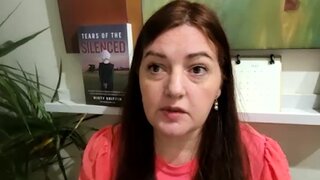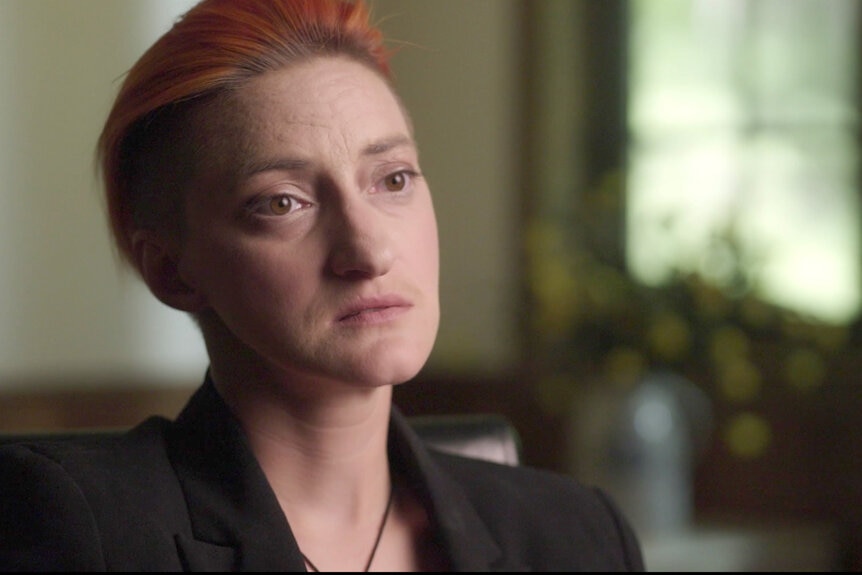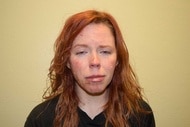Create a free profile to get unlimited access to exclusive videos, breaking news, sweepstakes, and more!
Who Is Mary Byler Of ‘Sins Of The Amish’ And Where Is She Now?
Mary Byler recounts years of sexual abuse by male family members, including some of her own brothers, in Peacock's "Sins of the Amish."

Mary Byler was a small child when she was sexually abused by her biological father in their strict Amish community.
He died when Mary was just 5 years old, but the abuse didn’t end there.
For more than a decade, she said she was sexually abused by her cousins—who climbed through a window to ambush her—and some of her brothers, one of whom was so persistent he took the hinges off her bedroom door to get into her locked room.
Mary recounted the terrifying sexual assaults and what finally pushed her to seek justice for in Peacock’s new docuseries “Sins of the Amish,” which exposes the dark secrets hidden within closed Amish communities.
“It’s a predator’s paradise,” Mary said in the two-part series.
Often referred to as plain communities, Amish and conservative Mennonite groups separate themselves from the modern world, leading a simple life and adhering to a strict set of religious values.
“The church wields a large amount of power and control,” Hope Anne Dueck, the executive director of A Better Way, explained in “Sins of the Amish.” “Under the church you would have the men, and under that would be the women and under that would be the children and typically the wives only have as much voice as the husbands allow them to have, they have generally little to no voice in the church.”
The submissive role women take in Amish communities often extends to their home life, creating an environment that can put women at risk for sexual abuse.
“In plain communities we teach that men are almost animalistic in the way that they view women and sex and it’s a need, right? It’s described as men need sex,” said Pastor Jimmy Hinton, a religious communities anti-abuse advocate. “You hear how normalized that is when children are raped by family members they’re told ‘Well he needed to have sex with somebody,’ and it’s this objectification not only of women but of children.”
After being sexually abused by her biological father, Mary confided in her mother about the assaults, but was met with a disturbing response.
“That’s when she told me the first time what forgiveness is, which means you don’t talk about it, you don’t ever bring it up. He’s sorry and you have to forgive him,” she recounted.
As an Amish child, Mary spent her days working on the farm, caring for the animals, cooking and cleaning.
“I learned how to cook, clean, sew, bake, garden, but here’s the thing: I could have done all of those things without going through the years of trauma,” she said in “Sins of the Amish.”
As Mary got older one of her cousins began to sexually assault her as well.
“His sisters would lock me in a room so that he could climb in a window and rape me and they would laugh when I screamed,” she recalled. “Nobody gave a f---.”
The family moved a few years later, when Mary was about 8 or 9 years old, and she was given her own room, but her torment would only continue.
“Even in this new house, I wasn’t safe. I still see the building. This is where I remember my own brother being in the outhouse and assaulting me in the outhouse,” she said through tears.
According to Mary, she often tried to seek refuge in her room but her brother would take off the door hinges to get inside.
“This is where I remember not being safe in my room from my own f---ing brother,” she said, recalling how she used to feel as though she was “splitting into like two people” to mentally distance herself from the abuse.
While Mary continued to confide in her mother, she was never offered any help.
“I begged her, I begged her don’t leave me home alone with my brothers. I f---ing begged her,” she said. “She did it anyways. I don’t understand how you can be a parent and sit there and blame these children for being sexually assaulted.”
Mary decided to report the sexual abuse in 2004 after discovering that her younger sister was also being abused.
“It clicked like if I don’t do anything, my sister is going to grow up and have like the exact same hell as her childhood as I did,” she said in the docuseries. “No child deserves that.”
With the help of the Vernon County (Wisconsin) Sheriff’s Office, Mary wore a wire to gain evidence against her brothers. She talked to her brother Johnny in his barn as investigators closely monitored the situation, ready to intercede if Mary was physically threatened.
“Would you define what you did as sexual abuse?” Mary can be heard asking Johnny in the recording.
“Yes, I think it was,” he calmly replied.
Three of her brothers—Eli, David, and Johnny—were arrested and each admitted to abuse and agreed to plead guilty. Eli, who had a prior misdemeanor conviction, was charged with second-degree sexual assault of a child and sentenced to eight years behind bars, according to ABC News. David, who was charged with second-degree sexual assault of a child in connection with the abuse of Mary’s younger sister, received a four-year sentence, the outlet reported.
But it was Johnny’s sentencing hearing that gained the most attention. The Amish community brought in bus loads of people to support Johnny—while no one from the Amish community showed support for Mary.
“Johnny specifically said he had probably sexually assaulted his sister upwards of 200 times,” Vernon County District Attorney Tim Gaskell said in “Sins of the Amish.” “If somebody says 200 that probably, in my opinion anyways, probably means significantly more than that.”
Mary’s own mother even wrote a letter to the court asking for leniency for Johnny and explaining she believed her daughter had reported the abuse “out of spite,” Gaskell said.
“Ever since I learned to know Mary personally, she had a habit of making things sound worse than they really are,” she wrote.
In the courtroom, Johnny admitted the abuse in front of his supporters.
“I tell you Mary that I am sorry I have ruined your life,” he said. “I am also sorry to the Amish. I have pointed a real bad finger at the Amish.”
He was sentenced to 10 years of probation and just one year in the county jail, however, he was given work release and allowed to spend days with his family before returning to jail at night.
While Johnny was soon back in good standing with the Amish community, Mary was shunned.
“It’s not that it’s awful that he’s a rapist, it’s that it’s awful that I am unforgiving and reported it,” she said.
She described the trauma of leaving the only community she’d ever known in a podcast episode with Pastor Jimmy Hinton.
“To be shunned by everyone and everybody you’ve ever known, it’s horrible,” she said.
After leaving the community, Mary got a driver’s license, earned a GED and joined the Army, ABC News reports.
At the age of 22, she became a mother herself—something she told Hinton gave her a new understanding of her own childhood abuse.
“It made me understand and comprehend children do not ask for this, they are innocent, they are worthy of our protection,” she said. “It is our job to protect them.”
Mary has also devoted her life to helping other victims within the Amish community and founded the Colorado-based group The Misfit Amish.
The goal of the organization is to bridge the culture gaps between the Amish and the outside world, The Associated Press reports.
In April, she was one of the organizers of a powerful visual display in Pennsylvania that featured clothing from sexual assault victims from the Amish, Mennonite and other closed communities to dispel the belief that victims’ clothing could play a role in provoking their attackers.
“I have to believe we can stand together and make a difference. I have to believe that there are enough people that see these actions for the atrocities that they are, that we can all stand together and we can raise awareness, we can create education we can use the education already out there and we can make a difference,” she said in the 2021 podcast.
“I have to believe that, otherwise, I feel like I would lose any kind of hope and that would send me down a really dark path,” she continued.
Watch "Sins of the Amish," on Peacock now.


























